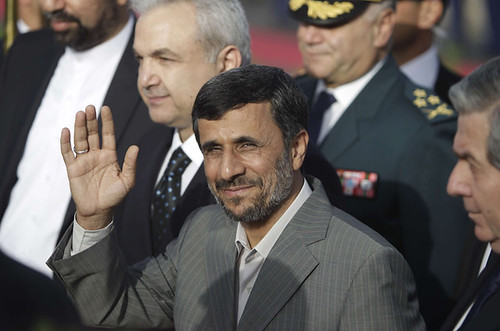
Iranian President Mahmoud Ahmadinejad paid a state visit to Lebanon where he was hailed as a major figure in regional politics in the Middle-East. The U.S. government has attempted to isolate Iran but the state has gained international acclaim., a photo by Pan-African News Wire File Photos on Flickr.
September 6, 2012 6:41 am
Iran hosts Islamic resistance festival
By Najmeh Bozorgmehr in Isfahan
Financial Times
Often called one of the world’s most beautiful cities, Isfahan is famous for its elegant architecture and formal gardens. It is also the city that 500 years ago was pivotal in transforming Iran from a Sunni-dominated country to a Shia one.
So it was the ideal backdrop for the regime in Tehran to host its “resistance” partners from the Palestinian Territories and Lebanon to discuss how they will triumph over US and Israeli threats to the Middle East, notably in Syria.
In a 300-year-old former caravanserai, representatives from Lebanon’s Hizbollah and Amal Movements, as well as Hamas and Islamic Jihad from the Palestinian Territories, gathered for the third International Conference and Festival of Islamic Resistance.
In a series of speeches at a conference hall covered in exquisite plasterwork, they recounted how resistance was key to the victory against Israel in Lebanon in 2006, and the 22-day siege of Gaza in 2008-09.
Their Iranian hosts made clear that it was Syria’s turn to resist what it sees as a global threat against Damascus as “punishment for its support for Palestine”. This resistance, however, should come through the government of Bashar al-Assad, rather than militant groups or a popular movement.
“Al-Qaeda along with the US, Israel and Arab reactionaries all intend to overthrow one government,” Ali-Akbar Velayati, senior adviser to Iran’s supreme leader, Ayatollah Ali Khamenei, told the conference on Wednesday. “It is because Syria is the golden link of the resistance chain against Israel.”
The conference is organised by the Sobhe Gharib Cultural Foundation, a non-governmental organisation with strong links to the Islamic regime which was established following Hizbollah’s 33-day war with Israel in 2006 and believes, in the words of one member, “we are nearing the dawn when all lands occupied by Israel will be freed”.
A special guest appearance was made by Sheikh Ali Jaber, a white-turbaned, snowy-bearded member of Hizbollah’s central council, who read a message from the group’s leader, Hassan Nasrallah.
Mr Nasrallah warned against “a new map” allegedly drawn by the west and Israel for the Middle East, and stressed “the Islamic resistance is firm and . . . will last and continue its activities”.
The bond between Isfahan and Lebanese clerics dates back to the 16th century when Shah Abbas Safavid transformed Isfahan into a Shia capital with the help of Lebanese Shia clerics, and began Iran’s transformation into a Shia-dominated state.
Iran is now Hizbollah’s main supporter, and the Lebanese group is crucial for Tehran’s influence in the region.
Iranian analysts believe the Islamic regime considers the crisis in Syria as a way for the west to undermine Iran and its links to Hizbollah, and use it, along with the stand-off over the nuclear programme, to change the Islamic regime.
This, they say, has made the survival of Mr Assad’s government a non-negotiable issue for the Iranian government.
Hamed Hasan, Syria‘s ambassador to Tehran, reinforced this message, telling the conference that “vicious plans” had been drafted by the US and other western states, as well as some regional countries, to destroy the “bridge” that linked “Iran to Hizbollah, Lebanon and Palestine”. He warned that the next step would be regime change in Tehran.
The Lebanese and Palestinian groups at the conference were less concerned with either Syria or Iran than they were about their own struggles.
Khaled Qadomi of Hamas barely mentioned Syria and concentrated on the party’s battles with Israel in the Gaza Strip, adding that resistance movements were no longer “isolated”, as they had helped to bring about the Arab spring.
Abdulnaser Sharif, Islamic Jihad’s representative in Tehran, only said that while his movement had “differences” with Syrian regime, it would not consider it an enemy.
No comments:
Post a Comment